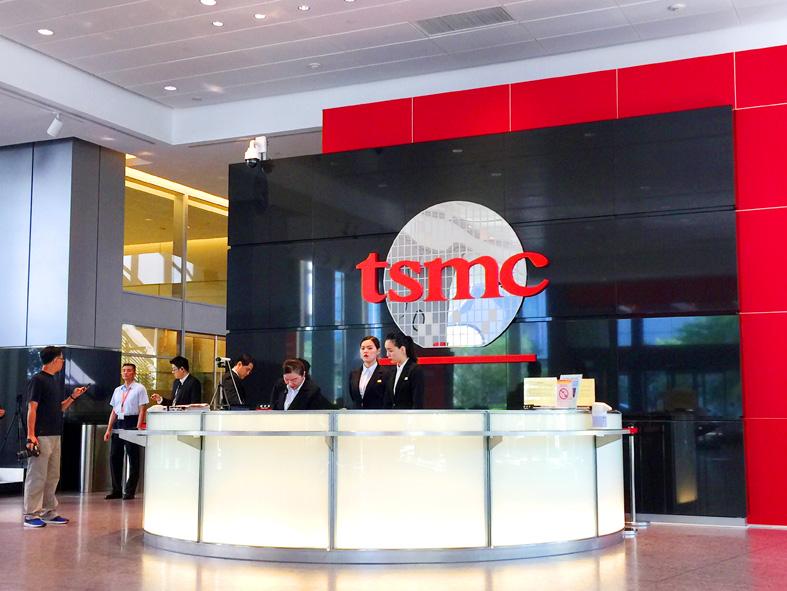To finance production expansions, Taiwan Semiconductor Manufacturing Co (TSMC, 台積電) would issue up to NT$120 billion (US$4.13 billion) in bonds, the company said on Friday.
The world’s largest contract chipmaker is to initially issue a batch of NT$21.1 billion in three unsecured corporate bond tranches: a five-year tranche of NT$4.8 billion with a coupon rate of 0.5 percent, a seven-year tranche of NT$11.4 billion with 0.55 percent and a 10-year tranche of NT$4.9 billion with 0.6 percent, TSMC said.
The plan, approved by a board meeting last month, would increase production capacity through new facilities and equipment upgrades, and pollution prevention measures at its fabs, it said.

Photo: Grace Hung, Taipei Times
Capital Securities Corp (群益證券) would serve as the lead underwriter of the bond sale, TSMC said.
In an investors’ conference held in mid-January, TSMC vice president and chief financial officer Wendell Huang (黃仁昭) said that the company would spend US$25 billion to US$28 billion on capital expenditure this year, a record for the chipmaker.
US-based advisory firm IC Insights said that governments in the US, EU and China would each have to spend at least US$30 billion per year for five years to catch up with TSMC and South Korea’s Samsung Electronics Co.
The combined capital expenditure of TSMC and Samsung is forecast to total at least US$55.5 billion this year, making it unlikely for any other chipmaker to rival them in spending, IC Insights said, adding that the two firms are expected to further widen their technology gaps with their competitors.
However, capacity shortages in the chip industry have over the past few months disrupted production at smartphone makers and automakers.
On Wednesday, Samsung said that its smartphone production in the second quarter could be affected by global chip shortages.
Seoul-based NH Investment and Securities Co said in a note on Thursday that the situation would start improving in the second half of this year, as operations at TSMC fabs in Taiwan and a Samsung fab in Austin, Texas, would return to normal, and new facilities of both companies would assume operations.

MULTIFACETED: A task force has analyzed possible scenarios and created responses to assist domestic industries in dealing with US tariffs, the economics minister said The Executive Yuan is tomorrow to announce countermeasures to US President Donald Trump’s planned reciprocal tariffs, although the details of the plan would not be made public until Monday next week, Minister of Economic Affairs J.W. Kuo (郭智輝) said yesterday. The Cabinet established an economic and trade task force in November last year to deal with US trade and tariff related issues, Kuo told reporters outside the legislature in Taipei. The task force has been analyzing and evaluating all kinds of scenarios to identify suitable responses and determine how best to assist domestic industries in managing the effects of Trump’s tariffs, he

TIGHT-LIPPED: UMC said it had no merger plans at the moment, after Nikkei Asia reported that the firm and GlobalFoundries were considering restarting merger talks United Microelectronics Corp (UMC, 聯電), the world’s No. 4 contract chipmaker, yesterday launched a new US$5 billion 12-inch chip factory in Singapore as part of its latest effort to diversify its manufacturing footprint amid growing geopolitical risks. The new factory, adjacent to UMC’s existing Singapore fab in the Pasir Res Wafer Fab Park, is scheduled to enter volume production next year, utilizing mature 22-nanometer and 28-nanometer process technologies, UMC said in a statement. The company plans to invest US$5 billion during the first phase of the new fab, which would have an installed capacity of 30,000 12-inch wafers per month, it said. The

Taiwan’s official purchasing managers’ index (PMI) last month rose 0.2 percentage points to 54.2, in a second consecutive month of expansion, thanks to front-loading demand intended to avoid potential US tariff hikes, the Chung-Hua Institution for Economic Research (CIER, 中華經濟研究院) said yesterday. While short-term demand appeared robust, uncertainties rose due to US President Donald Trump’s unpredictable trade policy, CIER president Lien Hsien-ming (連賢明) told a news conference in Taipei. Taiwan’s economy this year would be characterized by high-level fluctuations and the volatility would be wilder than most expect, Lien said Demand for electronics, particularly semiconductors, continues to benefit from US technology giants’ effort

‘SWASTICAR’: Tesla CEO Elon Musk’s close association with Donald Trump has prompted opponents to brand him a ‘Nazi’ and resulted in a dramatic drop in sales Demonstrators descended on Tesla Inc dealerships across the US, and in Europe and Canada on Saturday to protest company chief Elon Musk, who has amassed extraordinary power as a top adviser to US President Donald Trump. Waving signs with messages such as “Musk is stealing our money” and “Reclaim our country,” the protests largely took place peacefully following fiery episodes of vandalism on Tesla vehicles, dealerships and other facilities in recent weeks that US officials have denounced as terrorism. Hundreds rallied on Saturday outside the Tesla dealership in Manhattan. Some blasted Musk, the world’s richest man, while others demanded the shuttering of his